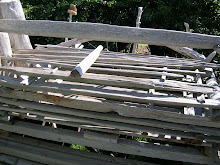
Boundaries
The exploration of points of view and the resolution of dualities lead me to boundaries. Boundaries become porous as we dissolve dualities. We can decide on the boundary conditions for what we believe. In play we reset the boundary. As we think about a duality, we decide where on the continuum we cross over from one condition to the other. Sometimes we forget that there always exists a point next to the one just considered. Thus we end up with a situation where we include that one or we decide not to. If not, then we have the boundary. Some boundaries tend toward greater subtlety. Some create a proverbial brick wall. We need boundaries to help us distinguish what we mythically establish as our self or ours. It helps sometimes to playfully let go of this duality of mine and not mine.
(Mind and Not Mind: As a child I couldn’t hear the difference between the words mind and mine. I mixed them up, usually using mind when I meant mine. I remember the embarrassment and helplessness that I felt when this occurred. Now it seems more curious that the distinction took so long to form in my brain.)
It helps us notice that in a way everything belongs to everybody already, even if we like to think of it as only ours. If everyone interrelates as human or even as alive or even chemically of this planet, then from one perspective, we create a single world organism and everything we own exists as part of the world resource. So what each of us has, all of us have as well.
The duality disappears and so does the boundary. Paradoxically I construct a situation where the boundary creates a helpful resolution. I seek something related to fences making good neighbors. In some cases my immediate surroundings help me settle in to write. I create an artificial state where writing occurs and step into it. I set up a duality to establish a location for action. I have the boundaries to help me structure my perspective, I can play with the boundary and see what new effect I can accomplish.
Boundaries create funny lines. I found myself reinforcing boundaries when using the metaphor of a river in a young person’s book report. The river metaphorically separated good and bad, past and future, hope and despair, and even life and death. But which river does that?
Duality Exercise #6: In and Out of Bounds
Write about a memory of a time associated with getting out. Write a description along the edge of some page or object. Getting out could be literal or metaphoric. Let it follow the edge; let the text butt up against the edge. It can trail over the edge. It can line by line approach the edge and break up words. The letters can squeeze up at the edge. Now imagine a riverbed of text. Write it on another part of the surface. Let it separate one region from another. Decide what idea the river separates. Write about getting in, or staying in, or what is left inside the boundary below the river of text. The text can even flip to the other side, crossing another boundary. Add a time and place for the memory and for the present.
 I sense the river could also dry up. When dried up it becomes a depression in the land where water once flowed nourishing both sides of the bank. What do our boundaries delimit? Do they become the illusions by which we reinforce our faith in the game of life? Do we use them in such a way that the game matters and we matter. When we become concerned about personal meaning, do these beliefs perform a service? They also cause tremendous suffering. We may want to simply experience the river and its in-between-ness.
I sense the river could also dry up. When dried up it becomes a depression in the land where water once flowed nourishing both sides of the bank. What do our boundaries delimit? Do they become the illusions by which we reinforce our faith in the game of life? Do we use them in such a way that the game matters and we matter. When we become concerned about personal meaning, do these beliefs perform a service? They also cause tremendous suffering. We may want to simply experience the river and its in-between-ness.

No comments:
Post a Comment